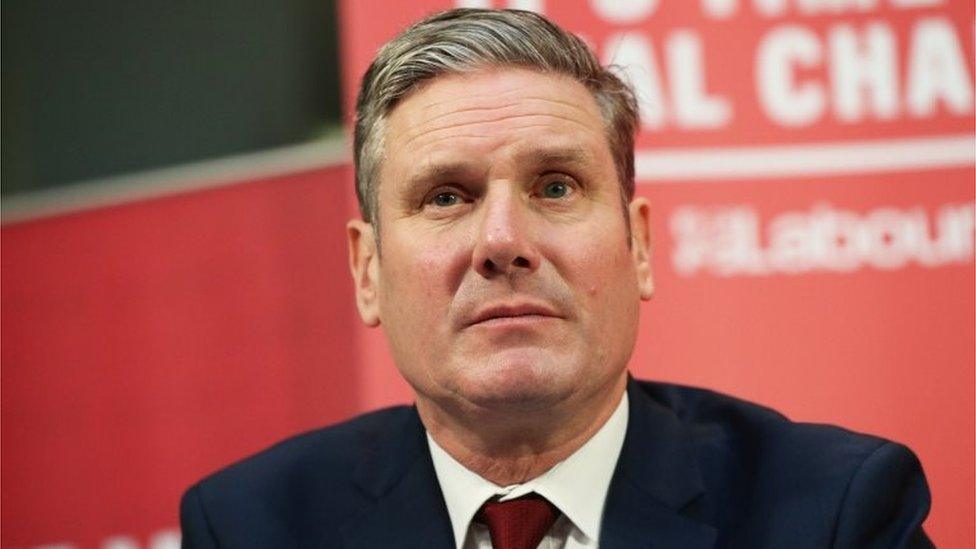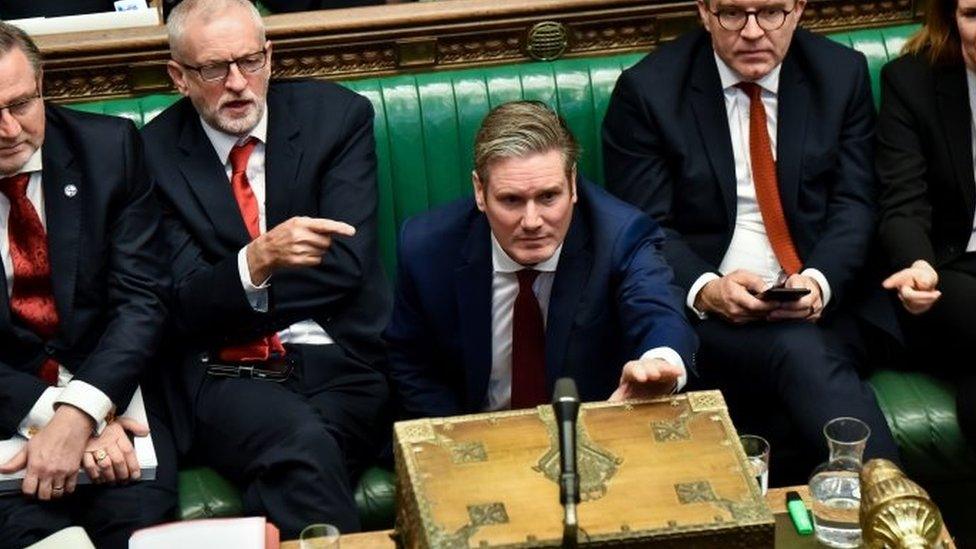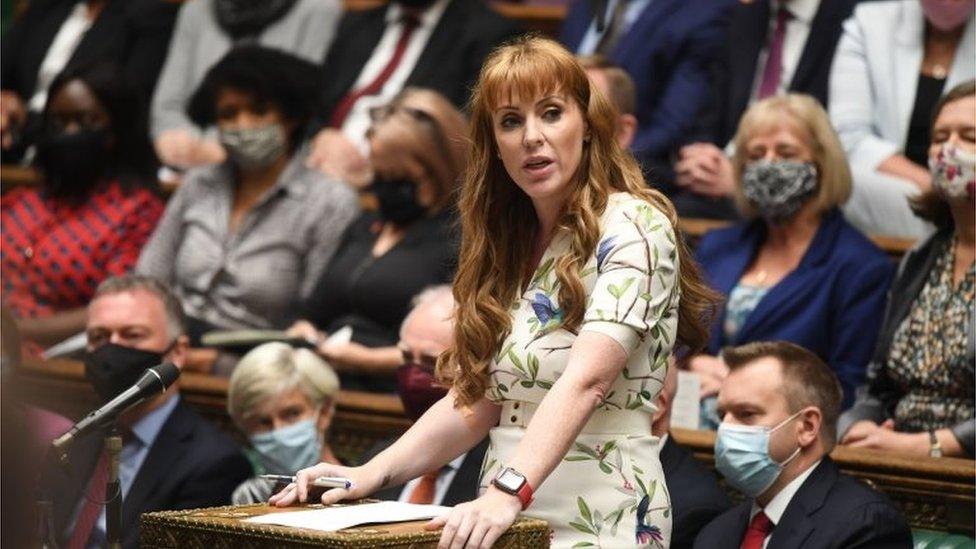Keir Starmer is taking a big risk
- Published

The Labour conference in 2019 was the last before the pandemic and before Sir Keir became leader
Eighteen months into the job, the Labour leader is finding out that it's impossible both to change his party and maintain unity.
And that's despite the phrase on Sir Keir Starmer's literature during his leadership campaign: Reform and Unite.
Sir Keir is taking a big risk.
Now that's a phrase you don't see every day.
If anything, he has been criticised for his caution.
But now he is taking a fight to his internal opponents - attempting to change how future Labour leaders are elected, and how MPs are selected.
This has infuriated the left of the party.
They believe his proposals to give less say to rank-and-file members in leadership elections, and to make it more difficult to challenge sitting MPs, are part of a wider push to "de-Corbynise" the party.
Danger
The danger for Sir Keir is this: he will be addressing his first in-person conference as party leader on Wednesday.
His aides feel he has to "reintroduce" himself to voters.
In short, he has to make an impact.
While he will set out more clearly what he stands for, a battle with internal opponents this weekend could leave voters with the impression that under his leadership, Labour is a divided party.
Not everyone who advises Sir Keir wanted him to pick a fight with some of his own members.
But with the chatter about an early election in 2023 reaching a high pitch at Westminster, those who believed it is better to have any internal battles this year have prevailed.
If he scores some victories against the odds, they think it will only strengthen him, and they are confident this won't obscure the message he is trying to convey.
Indeed, it could achieve the opposite.
Clean break
This group of advisers want to send a signal that the Corbyn era isn't coming back and, in that way, they think people are more likely to listen to what Sir Keir has to say.
So what will they hear?
The conference slogan will be "Stronger Future Together".
Insiders believe this speaks to the "togetherness" and solidarity shown by people during the pandemic; but that it suggests, too, that Labour would address the challenges that the coronavirus pandemic has exposed.
And "togetherness" is - ironically enough - about creating dividing lines with political opponents.
It highlights Sir Keir's claims that the Conservatives have stirred up divisions in society, and it signals that he will step up his attacks on the SNP, arguing that it is wrong to divide the UK.
The emphasis on the future is straightforward: Sir Keir believes Labour has done best when it has been optimistic and promised change - from Harold Wilson's white heat of technology, external to Tony Blair's New Labour, New Britain.
The new Labour leader recorded a video where he spoke of the "honour" of the post.
Of course, he will need to use the coming week to provide concrete examples of what the future would look like if Labour were to be elected.
Although the party is in the midst of a policy review, some new announcements are expected from day one.
When he makes his speech, his intended audience won't be in the Brighton conference hall - it will be aimed at those voters the party needs to win back, or win over.
So there will be a strong emphasis - with echoes of the New Labour era - of standing up for "hard-working families who play by the rules".
But the physical audience at the conference will also be told that they need to focus relentlessly on what interests voters, rather than on what pre-occupies them.
Security and opportunity
Sir Keir set out his stall in a pre-conference essay, external.
Target voters are unlikely to devour the entire tract but some themes will be distilled or developed in his more user-friendly conference speech.
The pamphlet is peppered with the phrase "security and opportunity".
That is, of course, aimed at those in insecure employment, who are concerned about their financial future.
But it also plays to Sir Keir's own background - as a former Director of Public Prosecutions - and is aimed at reassuring sceptical voters that his background is very different from that of his predecessor, Jeremy Corbyn.
"Opportunity" embellishes the narrative that he came from a relatively ordinary background and while he succeeded in his former profession, many people today don't feel they, or their children, have the same life chances.
The hope is that this positioning will have broad appeal.
Mountain to climb
When elected as Labour leader, Sir Keir declared that Labour had a mountain to climb.
It has turned out to be K2, not Ben Nevis.
His pamphlet was published by the Fabian Society think tank - but a forthcoming report from them may be just as significant.

Keir Starmer served on Jeremy Corbyn's frontbench as shadow Brexit secretary
They have found that support for Labour is still concentrated in either areas with a high proportion of graduates, or places with the greatest deprivation.
It suggests a focus on winning back so-called 'red wall' seats might boost Labour's parliamentary contingent by only around 40 MPs - a good start, but well short of a majority.
For Sir Keir to get to No 10, he will have to look at winning back towns that the party lost not just in 2019 but in 2010, and, in some cases, 2005.
Green shoots
However, an analysis from the former shadow cabinet member Jon Trickett - to be fair, not a fan of the Labour leader - warns that the party isn't guaranteed to make progress at the next election.
He points out that some of the 'red wall' seats Labour retained have been transformed into marginal seats - including his Hemsworth constituency in Yorkshire.
And a rise in the Green vote in some areas could further depress Labour support and leave some of those seats vulnerable.
One of the lessons he draws is that any attempt to tack to the right, or pick a fight with the left, might encourage progressive voters to go elsewhere.
Radical reassurance
While Sir Keir wants to reassure voters who have drifted - or run - away from Labour that it is safe to come back, some of the policies developed under his leadership may be more radical than his rhetoric suggests.
The most developed area of proposals is on employment rights.
The shadow minister Andy McDonald and deputy leader Angela Rayner have been constructing what is being badged as a "new deal for working people".

The deputy leader, Angela Rayner, stood in for Sir Keir at PMQs this week
This will feature prominently on the first day of conference, with commitments to ban zero hours contracts, and giving rights to workers from their first day in employment,
One insider points out that "all this is to the left of Ed Miliband".
Supporters of the proposals believe it will give Labour something solid to offer lower paid voters in particular who don't believe politics works for them.
Part of the union
But some MPs have been suggesting that the agenda could have an additional purpose.
With the unions accounting for half the voting strength at Labour conference, Sir Keir needs two or three of the larger organisations onboard to ensure his party reforms go through.
So it is hoped that a strong agenda of employment rights, and the offer of a say in future leadership contests, may do the trick.
This would deliver him a victory, but this isn't guaranteed.
It looks like no final decision will be taken on whether to table the leadership reforms until a meeting of Labour's ruling national executive concludes on Friday night.
Some unions will remain opposed, others may be keener to extract a price.
However it is thought that enough unions will at least weigh in to see off some incoming challenges, including an attempt to oust the party's most senior official and Starmer ally, the General Secretary David Evans, and a move that could lift Jeremy Corbyn's suspension from the Parliamentary Labour Party.
A question of trust
The conference will open on Saturday morning against a backdrop of rallies and demonstrations from leftwing groups such as Momentum.
Many on the party left are accusing Sir Keir of a breach of trust.
During his leadership campaign, he said: "We must embed into our systems and actions the principle that all members are equal."
Now he is aiming to reduce the say that those members will have in leadership contests.
But his allies insist the trust he will be focussed in regaining will be that of voters, not activists.
The question now is whether even a successful defeat of the left will be seen as division, or decisiveness.